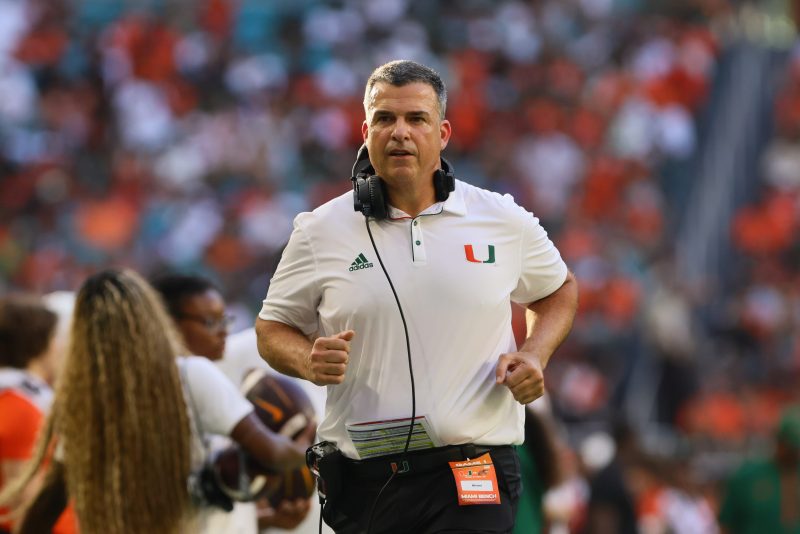
Miami, Indiana have playoff problem with weak schedules compared to SEC
When you can’t possibly imagine another sickeningly simplistic argument to make the College Football Playoff, Miami arrives to the party and we’re all worse for it.
Temporarily, anyway.
“Award teams for winning football games,” Hurricanes coach Mario Cristobal told Miami radio station WQAM. “We won 10 games this year, and not many teams have.”
Now we’re going down this road? OK, I’ll bite.
Army won 10 games. So did Memphis. So did Boise State and UNLV and Louisiana-Lafayette.
But, you say, those Group of Five conference schools have an easier road to 10 wins because of fortunate schedules.
Ding, ding, ding.
It is here where we introduce transitive property, because what’s used in one level of argument must be used at an increased level. In other words, power conference vs. power conference.
Let’s begin with basic math: 13 Power Four teams have won at least 10 games, and there could be another if Clemson wins the ACC championship.
Because there are five automatic qualifying spots – likely the Power Four conference champions, and the highest-ranked Group of Five conference champion – that leaves seven playoff spots for nine 10-win teams (possibly 10, if Clemson wins).
How do you find seven from nine, you ask? Strength of schedule.
And now you see how Miami and Indiana – two teams with 10 or more wins that played weak schedules – have backed themselves into a corner. The only way out is mental gymnastics.
Don’t believe what you see, believe what you’re told.
Because there’s only one logical way to determine seven from nine when head-to-head doesn’t figure into the conference vs. conference equation. Only strength of schedule does.
Not “eye test” (whatever that means), not game control (what could that possibly have to do with wins and losses?), not average margin of victory against a clearly advantageous schedule.
When the final poll arrives, it’s who did you play and who did you beat — especially when season victory totals are the same, or even one game difference.
Now we move to the excuses. For the Miamis and Indianas of the world, the excuse is you can only play who’s on your schedule.
For the nine-win teams in the SEC, the excuse is the road to 10 is more difficult in the SEC than any other conference.
Let’s be very clear again: if we’re using the argument that you can only play who’s on your schedule, there’s no separation between Miami, Indiana and the other Group of Five schools with 10 wins.
See where this is headed? You can’t have it both ways.
If you’re Indiana and Miami and you’ve scoffed at the path to 10 wins for the Group of Five teams, what prevents the same standards to be placed on your road to 10 wins from the nine-win teams in the SEC (Alabama, South Carolina, Ole Miss)?
Your entire argument is you have one more win with a significantly easier road to those wins. At some point, that argument dies.
Alabama has three wins against top 25 teams in the playoff rankings before Tuesday’s release. (No. 7 Georgia, No. 15 South Carolina, No. 21 Missouri).
South Carolina has three wins against current ranked teams (No. 12 Clemson, No. 20 Texas A&M, No. 21 Missouri).
Ole Miss has two wins against top 25 teams (No. 7 Georgia, No. 15 South Carolina).
Miami and Indiana have no wins over ranked teams.
So we’re supposed to believe that one more win through a fortunate schedule is the be-all, end-all in determining if a team is CFP worthy. That’s laughable on its face, and any other objective manner of evaluation.
“The awards should go to the teams that are actually winning the games,” Cristobal said. “Not the ones that are politicking themselves out of losses.”
They’ve backed themselves into a circular argument, and the only way out is the 13-member CFP selection committee that will choose those 12 teams based on … who knows?
Indiana is the No. 10 team in the CFP, and has played one game against a current top 25 teams. And lost by 23 points.
There is no other tangible reason for Indiana to be ranked where it is, and to be awarded one of the 12 spots ― other than 13 people watching games think the Hoosiers are worthy.
Don’t believe what you see, everyone. Believe what you’re told.
Matt Hayes is the senior national college football writer for USA TODAY Sports Network. Follow him on X @MattHayesCFB.
